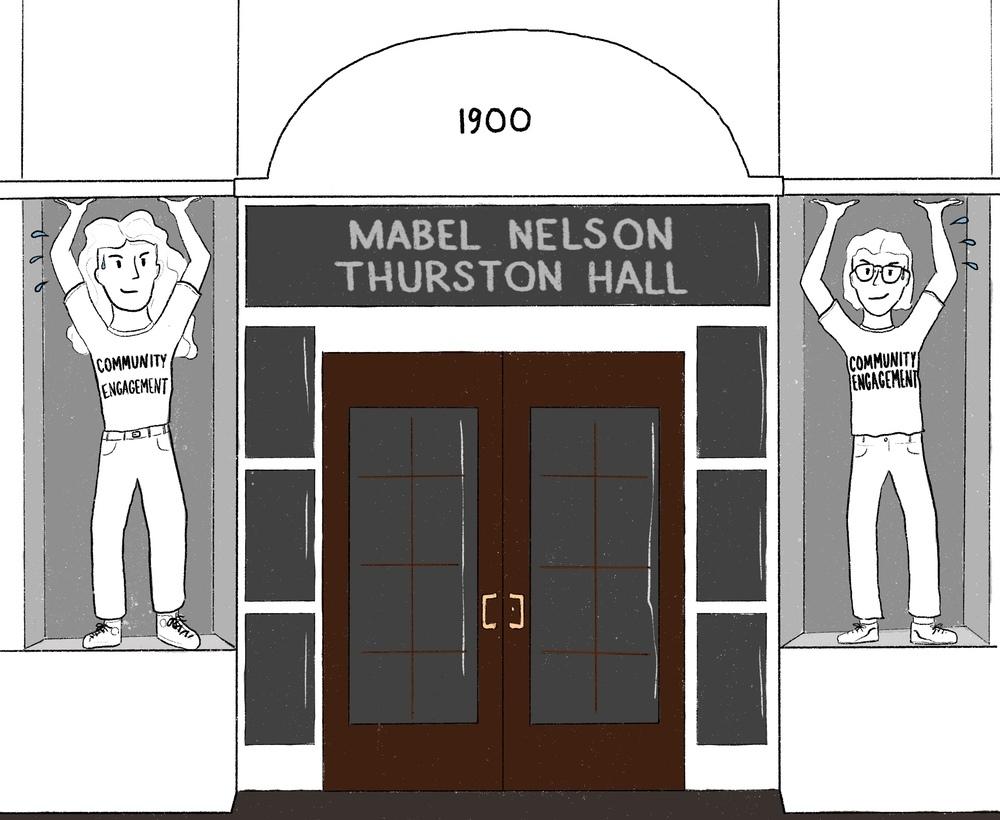Whether they were choked with mold in 2021 or the site of a dramatic renovation last year, GW’s residence halls are students’ home away from home. No matter the name, street or room layout, residence halls give students a place to catch up on homework, hang out with their friends or relax after a long day of lectures. And thanks to a new plan from Campus Living and Residential Education, freshmen should have some extra help navigating their transition to residential college life starting this fall.
CLRE is searching to hire students who will live in GW’s 14 freshman residence halls to organize community events, settle disputes between roommates and design lobbies and bulletin boards for the next academic year. Though likely fewer in number than the resident adviser program the University eliminated in 2021, the new community engagement adviser and assistant positions can connect freshmen to upperclassmen as the University markets its residence halls as community hubs.
The live-in adviser position and the more support-focused assistant position are supposed to aid community coordinators – the professional staffers who plan social events, mediate disputes between residents over shared space and noise complaints and manage GW’s residence halls on a daily basis. But those of us who remember the days of RAs before the COVID-19 pandemic know community coordinators haven’t always connected with students as much as their fellow peers did.
Community coordinators can feel more like a building supervisor or leasing agent than a helpful neighbor down the hall. Other than being a few years apart, a freshman resident and an RA would likely have a lot in common – they’re both GW students, for one. With RAs, students could go to a peer on their floor who might have experienced the same pangs of homesickness, an unfriendly professor or an oddball roommate just a year before. An RA wasn’t just someone you went to if you and your roommate couldn’t agree on how to split your shelves. From one student to another, they were a wealth of advice, expertise and knowledge ready to support campus residents navigate the transition to a more independent adulthood.
Compare that to a community coordinator in their late 20s who has never attended the University before. What do they have in common with a freshman? The dynamic students have with community coordinators is entirely different – they can feel more like an email address or a sign on a door than part of residents’ day-to-day lives. And that makes it harder, albeit not impossible, to foster connections with students.

Maura Kelly-Yuoh | Staff Cartoonist
To community coordinators’ credit, being the first point of contact to address the needs of hundreds of student residents at any hour of the day is no easy task. And GW’s pandemic-era policies constrained the limits of their jobs, restricting students to one guest from their residence hall per room and barring guests from other University residential buildings altogether. All the same, donut and ice cream socials can only go so far to make students feel like they belong at the University, especially freshmen who are away from home and likely sharing their living space for the first time.
RAs functioned as community builders, mentors, friends and even older siblings who could make an otherwise rocky transition to college as smooth as possible. They orchestrated floor-wide late night snack runs, baked batches of cookies after a full day of classes and helped solve roommate conflicts far above their pay grades.
But the burdens student employees faced, which also led RAs to push for a labor union in 2016, is partly why officials discontinued the RA position in favor of community coordinators. RAs had to face uncomfortable, upsetting and even dangerous situations in the course of counseling residents and dealing with noise complaints, sexual assault cases or intoxicated students, then-Vice President of Student Affairs and Dean of Students Cissy Petty said in 2021.
CLRE’s new community engagement advisers and assistants capture the essence of what made the RA program work. Physical proximity to an older, trusted peer could help make freshmen residence halls and GW as a whole more welcoming. Gearing the position toward freshmen is also just good sense – students jumping into the deep end of college life can benefit from a mentor once they move to the Foggy Bottom or Mount Vernon campuses.
And over the past year, it’s been easier than ever to eat, sleep, study and meet with friends all from the comfort of your own home at GW. Officials have tried to redefine the residential experience this school year with new all-you-can-eat dining halls in Shenkman and Thurston halls and extensive renovations to Thurston. And while the crowds of students that patronize and live in these residence halls show how popular they are, a crowd isn’t necessarily a community.
So starting this fall, community engagement advisers and assistants will face the challenge of drawing freshmen out of their rooms – and their cliques – to learn about their peers and GW. With any luck, they’ll be raising high in no time.
The editorial board consists of Hatchet staff members and operates separately from the newsroom. This week’s staff editorial was written by Opinions Editor Ethan Benn and Contributing Opinions Editor Julia Koscelnik, based on discussions with Sports Editor Nuria Diaz, Managing Editor Jaden DiMauro, Culture Editor Clara Duhon, Design Editor Grace Miller and Social Media Director Ethan Valliath.

